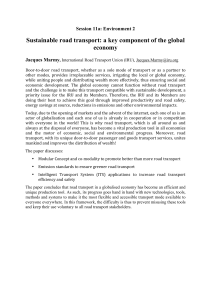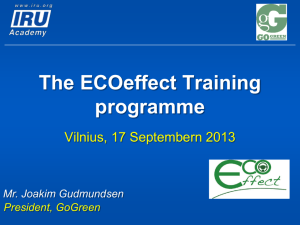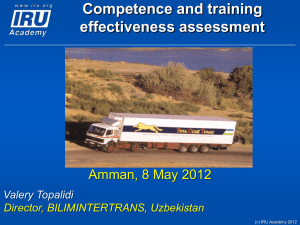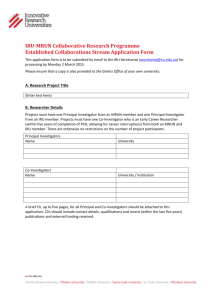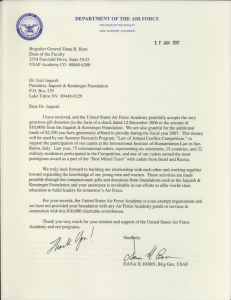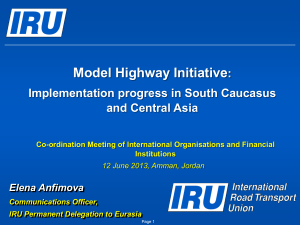The Importance of private-public parternship for a successful
advertisement
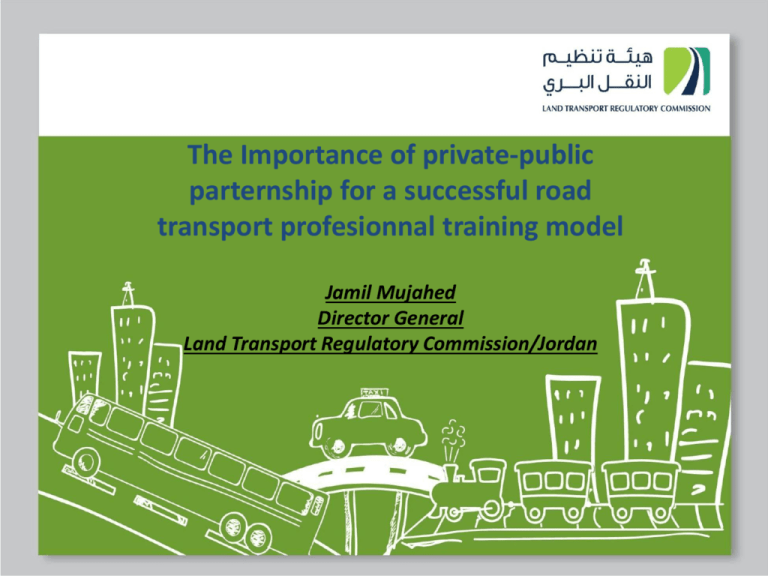
The Importance of private-public parternship for a successful road transport profesionnal training model Jamil Mujahed Director General Land Transport Regulatory Commission/Jordan The contribution of training to transport and trade facilitation Barriers to trade and transport related with external environment • Legal and administrative barriers. • Economic, Financial and physical barriers. • Technical barriers. • Practical barriers. Barriers to trade and transport related with internal operations, the barriers linked to knowledge and experience. (Training May Help) • Drivers not well trained. • Lack of knowledge payment condition procedures, legal issues international transport. • Lack of knowledge marketing and management free market principles. • Lack of knowledge on how to get return loads. • Lack of knowledge regarding modern logistics. • Lack of knowledge of cost calculation and relation to price setting. Why do we need professional training • Safety. • Increased customer satisfaction. • Profitability. Education and training in road transport sector. • There is a lack of leadership and vision in transportation for human resource policy and practices. • Transportation companies do not consider training a high priority. • Training considered as a cost not as an investment. • There is a substantial need for training of transport operations, and drivers. There is a substantial need for training of transport operations, and drivers. • There is a need for harmonized approach to the training. • There is a need for establishing a regional training centre for logistics forwarding and transport in the region. Public-Private partnership in trade and transport facilitation • • • There is a substantial need for training of Buildings up a sustained public-private transport operations, and drivers. partnership. • There is a need for harmonised approach to the Public-Private training. partnership (PPPs) are designed by and exist between public organization and cooperation's, companies, or •non-governmental There is a need for establishing a regional organization and working in collaboration to achieve mutually beneficial results. forwarding and training centre for logistics transport in MENA Region. In trade and transport facilitation , PPPs bring together stakeholders in trade and transportation to design and implement procedures that improve the efficiency of public and private management of international supply chain. • Both public institutions and private enterprises are part of full transport, trade, and logistics chain. • Both the public sector and private sector must be effective and cooperate on making the country more attractive to trader and investors. • Public-Private partnership can be an efficient and costeffective tool to pull down the numerous barriers that exist in the region. Model for co-operation in transport education and training. Transport and Logistics Ministry of Transport Universities Associations Industry Transport Operators Research Centers Good examples of partnership in transport training The IRU Academy • The IRU Academy is a professional road transport training organisation with a global reach. The IRU Academy creates a framework for capacitybuilding to enhance the efficiency, professionalism, effectiveness and accountability of the road transport training industry. • The IRU Academy offers its portfolio of training programmes to road transport professionals through its global network of Accredited Training Institutes (ATIs). The IRU Academy uses a multi-lingual content management system to ensure its programme materials are available to its members and instructors instantly. Transport Training Initiative (TTI) • TTi is a non-profit association and a network that aims at improving human capacities in the transport sector of Developing Countries. • • The idea is to train transport experts in their motherland using national and international training institutes, teachers and appropriate curricula. • TTi generates and conducts own projects. • The main focus is sustainable transport. IRU, AULT, RACJ partnership • Training for road transport currently lacks the existence of a regional entity which provides training for members from the whole Arab world. • The Arab Union of Land Transport (AULT), the International Road Transport Union (IRU) and the Royal Automobile Club of Jordan (RACJ) are establishing an IRU Academy Accredited Training Institute (ATI) in Amman. THANK YOU
